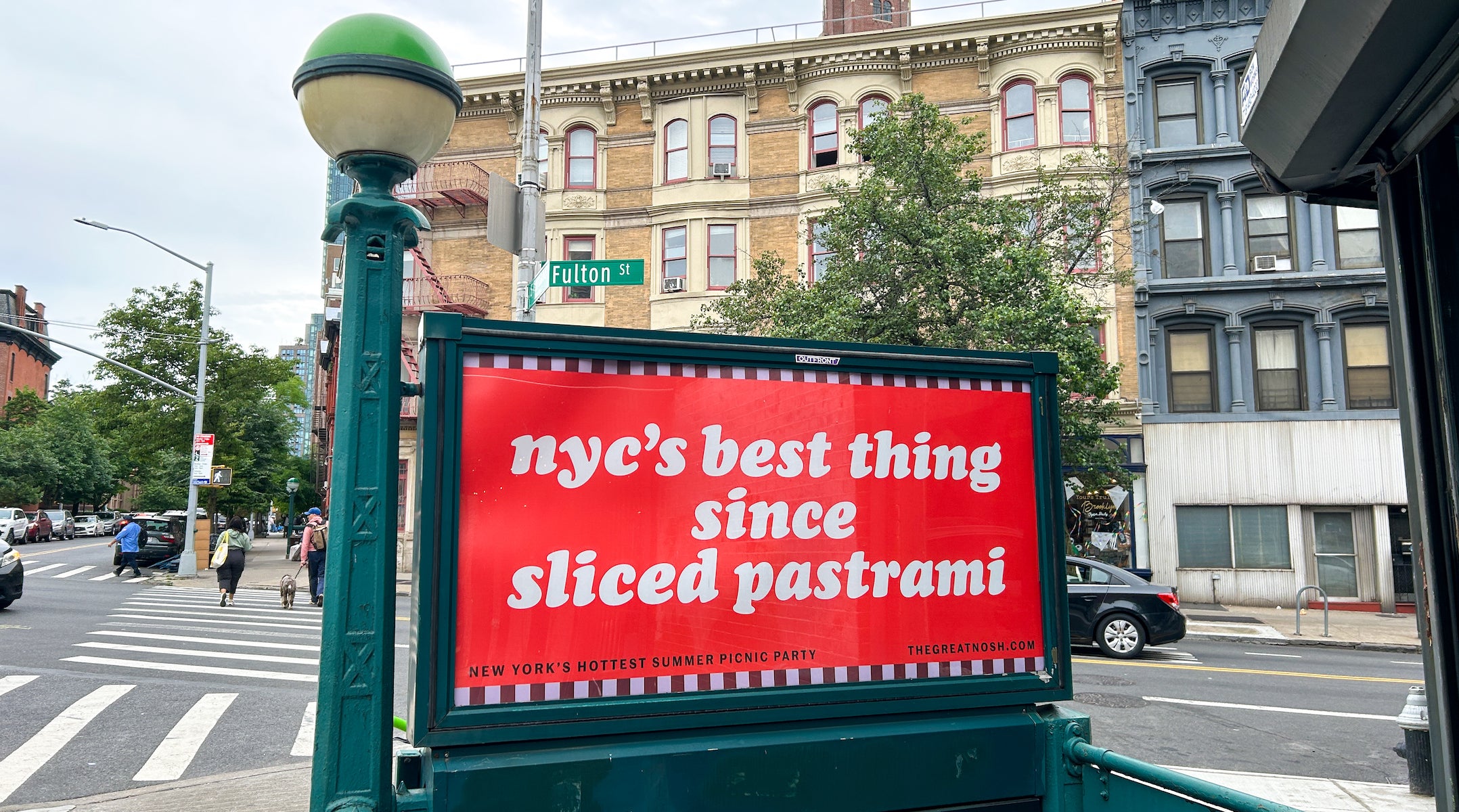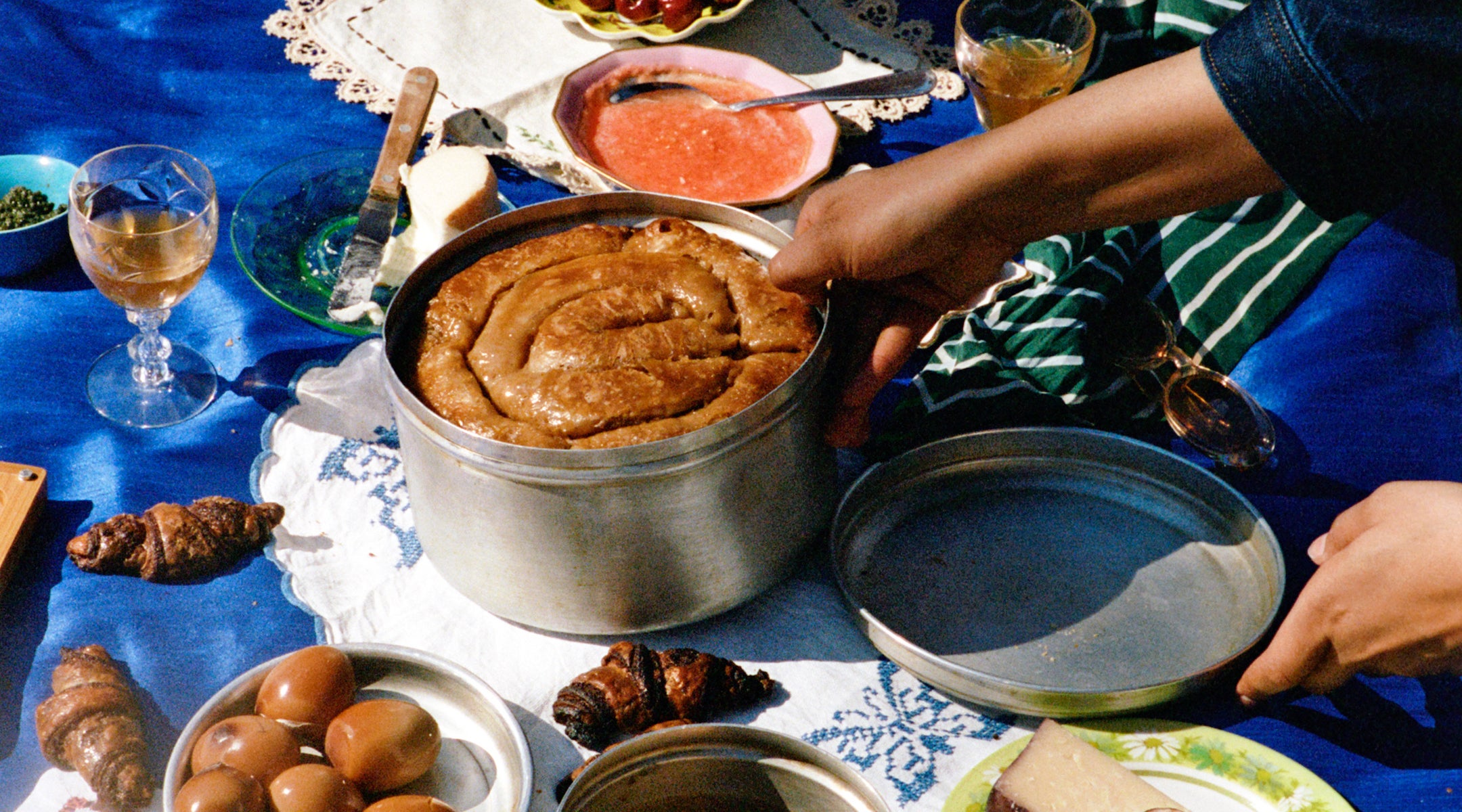When thousands of hungry Jews descend on Governor Island later this month for what organizers are calling “The Great Nosh,” they won’t just be filling their bellies with innovative dishes by buzzy chefs. They’ll also be joining a new trend in bigger-is-better Jewish events that is sweeping New York City.
The Great Nosh — designed to be a celebration of New York and of Jewish food and culture — is a project of the nonprofit Jewish Food Society, which got $500,000 in Jewish communal funding to mount what is being promoted as “New York’s hottest summer picnic party.”
Within four days of announcing the June 22 event and opening ticket sales on May 6, the 2,000 available tickets — priced at $36, plus handling fees — sold out, according to the group’s founder, Naama Shefi, a 44-year-old Israeli-American who lives on the Lower East Side. As of May 30, there was a waitlist of 2,000 names.
“I knew we were on to something really fabulous and exciting, but I didn’t imagine the amount of interest and demands,” Shefi said.
The Great Nosh is hardly the only large-scale Jewish festival hitting New York City over the next few months. Festival Sefarad, New York’s first-ever month-long celebration of Sephardic Jewish culture, is underway now.
Come September, the Jewish environmental organization Adamah will kick off Climate Week NYC with Rooted: A Jewish Day of Service for the Earth. A clean-up event in New York’s green spaces, Adamah expects to have more than 1,000 Jewish volunteers “rolling up our sleeves in parks, beaches, nature preserves and riverbanks across New York,” the organization wrote to the New York Jewish Week, all while spreading, “a tangible feeling of Jewish joy.”
And in November, Temple Emanu-El’s Streicker Cultural Center will host some 3,000 guests for what it hopes will be the world’s largest Shabbat dinner. The “Big Shabbat” is aiming to put New York into the Guinness Book of World Records, unseating Berlin, the current record-holder.
Why all these large events, and why now?
The groups, and their funders, are seeking to capitalize on what Jewish leaders have termed “The Surge” — increased interest in engaging with Jewish life and culture following Hamas’ Oct. 7, 2023 attack on Israel and the resulting feelings of isolation among many American Jews.
The term was coined last year after Jewish Federations of North America, the umbrella organization overseeing 146 local federations in a total of 400 Jewish communities, found in a survey that 43% of American Jews, across all levels of previous involvement, were seeking to or engaging more in Jewish life. A second survey, conducted in March, found that 72% of those identified in 2024 are still engaging more today — but the group said more must be done to help the newly engaged sustain their involvement and find Jewish experiences that meet their needs.
UJA-Federation of New York, a large philanthropy that in many ways serves as New York’s central Jewish address, has taken up the challenge, launching a “Capitalizing on the Surge Committee” charged with coming up with creative strategies to engage New Yorkers at a pivotal moment.
“People are allowing themselves to be open to thinking about Jewish life in a different way in this moment,” said Amy Bressman, the committee’s chair. “Our desire is to make that feeling that you had [at an event or program] last the rest of your life. That’s what we are going for. We are not going to look back and say all we did was fight antisemitism.”
Many of the new initiatives will take place in public, lowering the barrier to entry for Jews who might be less inclined to enter a synagogue or Jewish institution and offering a counterpoint to the low-profile, cloistered approach that some Jewish event organizers have recently taken amid concerns about security.
“UJA is funding a series of large-scale initiatives and opportunities to experience Jewish life in the public square, out in the open,” said Hindy Poupko, UJA-Federation of New York’s senior vice president of community strategy and external relations. “We continue to be a deeply proud Jewish community, a Jewish community that exists in the broader fabric of New York.”
The Great Nosh, with its hipster leanings and its focus on “epic chef collabs” such as Katz’s Deli with Thai Diner, and Russ & Daughters with Morgenstern’s, exemplifies the approach. UJA-Federation gave Jewish Food Society half a million dollars to pull off the event.
“This is an event catered to all New Yorkers,” Shefi said. “Jewish culture and New York City food culture are so deeply connected, and we will highlight this connection and also celebrate new interpretations and traditions.”
Shefi said the horrors of Oct. 7 are what inspired her to create The Great Nosh.
“It is now more than ever important to come together to celebrate Jewish culture in a way that fosters connection and understanding and joy,” she said. “This event is all about pride and resilience. It’s about sharing heritage in an open and welcoming way and I think it’s a chance to reinforce the power of community and to invite all New Yorkers to engage with Jewish culture in this very stylish, dynamic and vibrant way.”
Meanwhile, The Big Shabbat, which also received $500,000 from UJA, is set to take place Nov. 21 at the Javits Center.
“We are here. We are Jews. We are proud,” said Gady Levy, executive director of The Streicker Center, describing the event, which is in its early planning stages. “It doesn’t matter if you are Conservative or Reform, if you go to shul or you don’t go to shul. We are one community and we are going to celebrate Shabbat like the Jews did the moment they came to New York City.”

The Great Nosh, widely promoted online and across NYC, is one of several large Jewish events taking place this summer and fall. (David Gutenmacher)
Given recent attacks on Jewish events in Washington, D.C., and Boulder, Colorado, Shefi describes security as her first priority at The Great Nosh.
“That was one of the reasons that we picked Governor’s Island, because it is way easier to secure, to control who comes in,” she said. “We have an extremely tight and developed security plan.”
Shefi said that the Jewish Food Society is working behind the scenes with the NYPD, the city, and the Community Security Initiative, which coordinates security for Jewish institutions, to keep the picnic party safe so that participants, including Mexican-Jewish-American food writer and TV personality Pati Jinich, can focus on fun.
Jinich, who will host the Grandma’s Tent together with food personality Gail Simmons — featuring cooking demonstrations and tastings of traditional family recipes like hand-rolled couscous and Eastern European-style pickles — said she was drawn to participating in The Great Nosh by its positivity, optimism and joy.
“With food and cooking it is such a noble space,” she said. “You can build bridges and forge bonds rather than divide.”
Shefi hopes to expand The Great Nosh concept and help spread Jewish joy across the land. “But first we will take Manhattan,” she said. “The plan is to make it an annual celebration in our city and then take it across America.”
The New York Jewish Week brings you the stories behind the headlines, keeping you connected to Jewish life in New York. Help sustain the reporting you trust by donating today.





